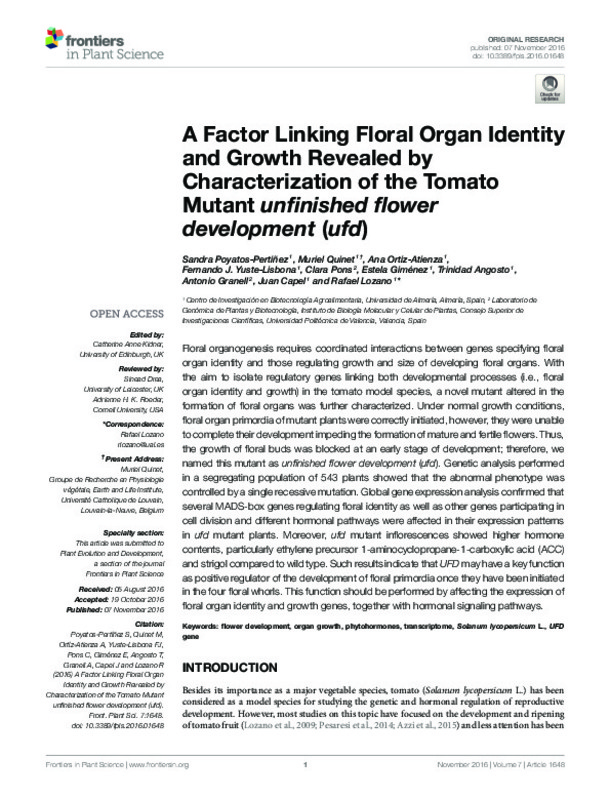JavaScript is disabled for your browser. Some features of this site may not work without it.
Buscar en RiuNet
Listar
Mi cuenta
Estadísticas
Ayuda RiuNet
Admin. UPV
A Factor Linking Floral Organ Identity and Growth Revealed by Characterization of the Tomato Mutant unfinished flower development (ufd)
Mostrar el registro completo del ítem
Poyatos-Pertinez, S.; Quinet, M.; Ortiz-Atienza, A.; Yuste-Lisbona, FJ.; Pons Puig, C.; Gimenez, E.; Angosto, T.... (2016). A Factor Linking Floral Organ Identity and Growth Revealed by Characterization of the Tomato Mutant unfinished flower development (ufd). Frontiers in Plant Science. 7(1648):1-15. https://doi.org/10.3389/fpls.2016.01648
Por favor, use este identificador para citar o enlazar este ítem: http://hdl.handle.net/10251/80999
Ficheros en el ítem
Metadatos del ítem
| Título: | A Factor Linking Floral Organ Identity and Growth Revealed by Characterization of the Tomato Mutant unfinished flower development (ufd) | |
| Autor: | Poyatos-Pertinez, Sandra Quinet, Muriel Ortiz-Atienza, Ana Yuste-Lisbona, Fernando J. Pons Puig, Clara Gimenez, Estela Angosto, Trinidad Capel, Juan Lozano, Rafael | |
| Entidad UPV: |
|
|
| Fecha difusión: |
|
|
| Resumen: |
Floral organogenesis requires coordinated interactions between genes specifying floral organ identity and those regulating growth and size of developing floral organs. With the aim to isolate regulatory genes linking both ...[+]
|
|
| Palabras clave: |
|
|
| Derechos de uso: | Reconocimiento (by) | |
| Fuente: |
|
|
| DOI: |
|
|
| Editorial: |
|
|
| Versión del editor: | http://dx.doi.org/10.3389/fpls.2016.01648 | |
| Código del Proyecto: |
|
|
| Agradecimientos: |
This research was supported by the Spanish Ministry of Economy and Competitiveness and the EU European Regional Development Fund (Grants BIO2009-11484 and AGL2015-64991-C3-R-1). We also thank Campus de Excelencia Internacional ...[+]
|
|
| Tipo: |
|









